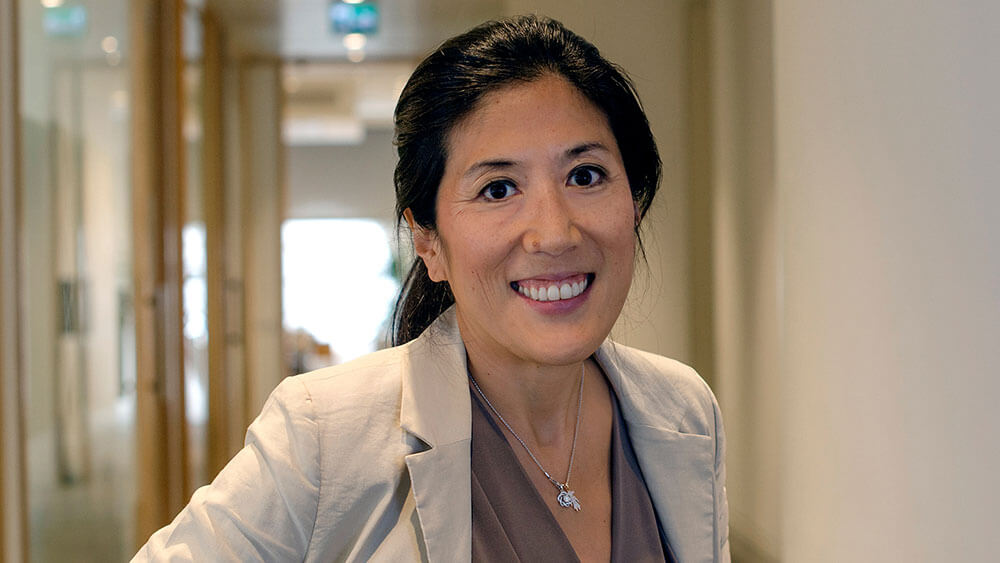
Helen Lee Bouygues, founder of the Reboot Foundation, says people have to be intentional about practicing critical thinking skills regularly. (Courtesy Reboot Foundation)
Helen Lee Bouygues has a friend, Mathilde Thomas, who grew up in the family wine business. One day, a friend of the family, a physician, came to visit their vineyard. Looking at the vat of grape skins that were about to be discarded, he said, “Well, that’s a pot of treasure, so why are you just discarding that?” That question led Thomas to found Caudalie, a successful line of skincare products made from grapes.
Bouygues told that story when she was interviewed on a recent Harvard Business Review IdeaCast to illustrate one of three simple habits that she has identified as key to critical thinking — diversify thought. Bouygues is the founder of Paris-based nonprofit the Reboot Foundation, which funds efforts to better integrate critical thinking into our daily lives, and she shared her other two habits — question assumptions, and reason through logic — in the podcast and in her HBR article, “3 Simple Habits to Improve Your Critical Thinking.”
Bouygues believes that there’s a dearth of critical thinking skills in today’s workplace because “we live in a world of incessant distraction,” she said. Plus, “when we have a question, we want that instant gratification getting the answer…. and we don’t actually have as much time to stop and think.”
We have to be intentional about practicing critical thinking skills regularly, she said. That requires that we make breaks part of our everyday practice. Going for a run or a walk around the block, “alone creates that opportunity,” Bouygues said, to slow down and think things through.
Habit 1: Questioning Assumptions
You can’t go around questioning everything, Bouygues said, but taking a questioning approach around your assumptions and beliefs is particularly useful when making a big decision. In addition to “how do you know?” and “what does the research say?” kinds of questions that you should ask yourself, she suggests considering “what if” questions, like: “What if our clients changed? What if our suppliers went out of business?”
Habit 2: Reason Through Logic
It’s also important to “pay close attention to the ‘chain’ of logic constructed by a particular argument,” she wrote in her HBR article. “Ask yourself: Is the argument supported at every point by evidence? Do all the pieces of evidence build on each other to produce a sound conclusion?”
Bouygues wrote that she once was in charge of turning around the division of a major lingerie company, which couldn’t figure out why sales of its bras were declining. “It turned out that the company had made the reasoning mistake of overgeneralization, drawing a sweeping conclusion based on limited or insufficient evidence.”
The company’s faulty assumption was that all of their international customers had similar preferences in lingerie. By speaking with customers and doing research, they learned that women in the U.K. tended to buy bright, lacy bras, women in Italy liked plain, beige bras, and that the U.S. led the world in sports bra purchases.
Habit 3: Diversity of Thought
While Bouygues illustrated this habit with the anecdote about her friend coming up with a new business idea because someone outside the winemaking business happened to remark that there was value in what is typically disposed of, she emphasized that we need to actively seek out these opportunities. It’s very human to stay in our “own personal bubble” because it’s comfortable, but soliciting other viewpoints is critical, she said. Making diversity of thought a regular practice at work can be simple as having lunch with people in different departments of your organization, she suggested, and listening to what they have to say.
Avoid ‘WTF’
Some companies think that by hiring outside consultants, they’ll do the critical thinking for them, but Bouygues doesn’t believe “that the industry of management consulting is a sector that is there to enforce critical thinking” for organizations, she said. That’s because, in her experience, a lot of CEOs are seeking validation and support for their preconceived notions, and consultants, she said, are often trained to agree with their clients’ theories.
And while optimism is a good trait for business leaders to have — “there wouldn’t be Ubers or eBays,” Bouygues said, “if we didn’t have entrepreneurs who have that charisma and exuberance” — in her experience, it’s a quality that needs to be checked in a critical- thinking framework. What she often finds among CEOs is something she calls WTF, which is not what it stands for in text messages, but “wishful thinking forever.”
One trait that you should cultivate to be a better critical thinker? “Be curious,” she said.
